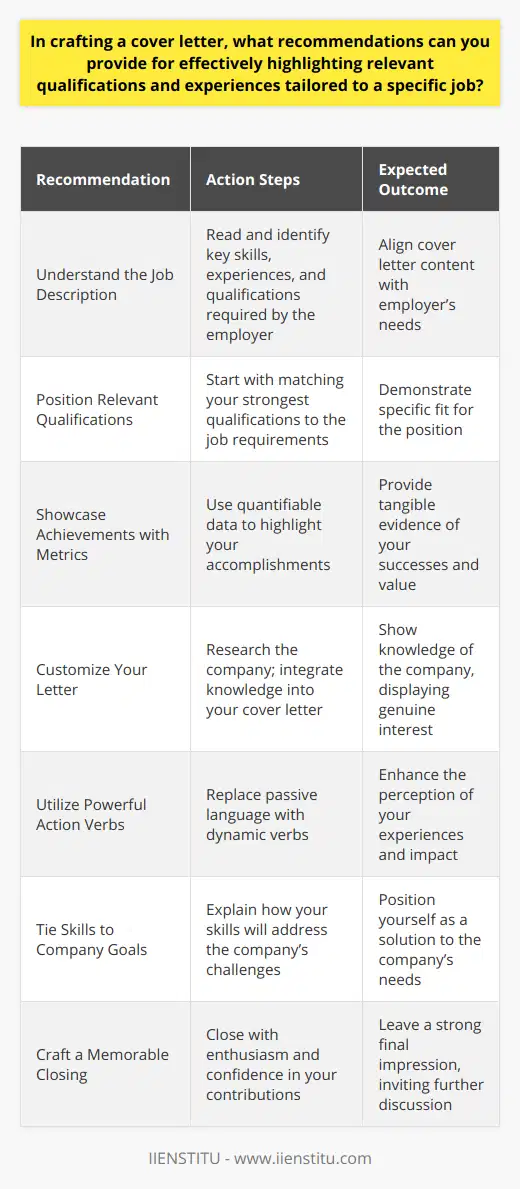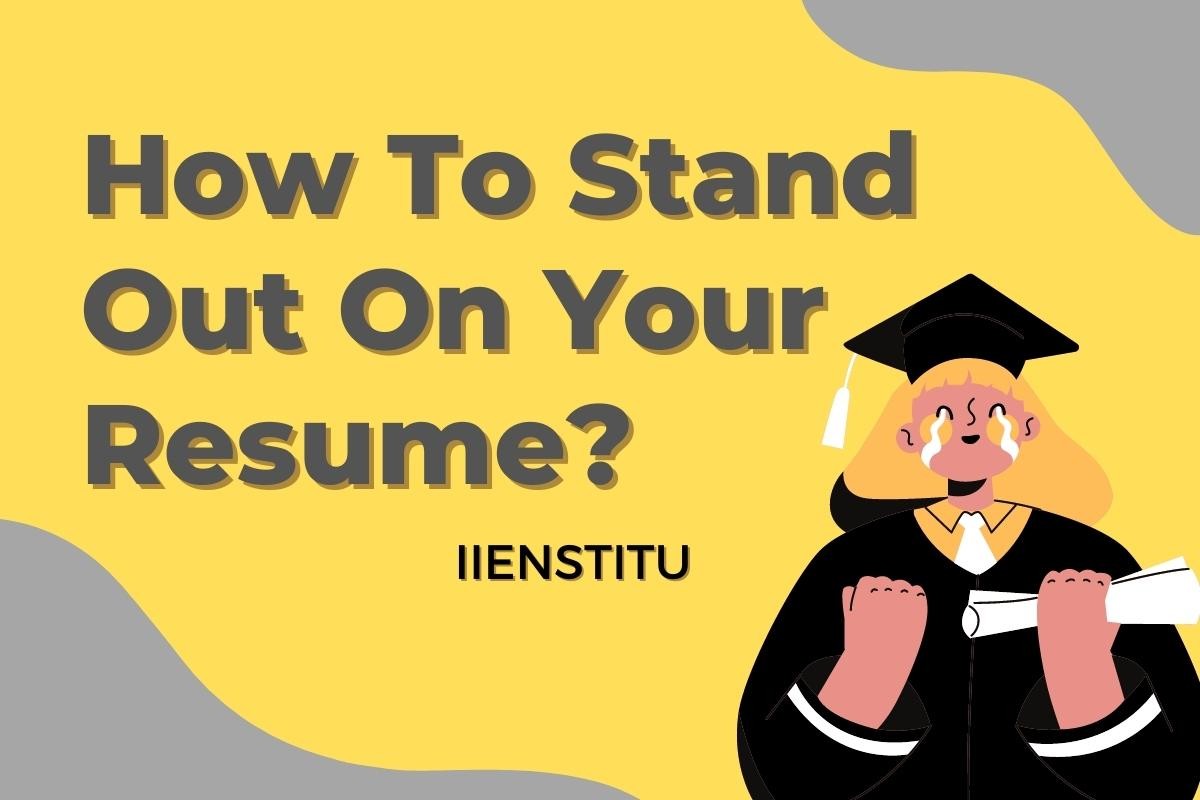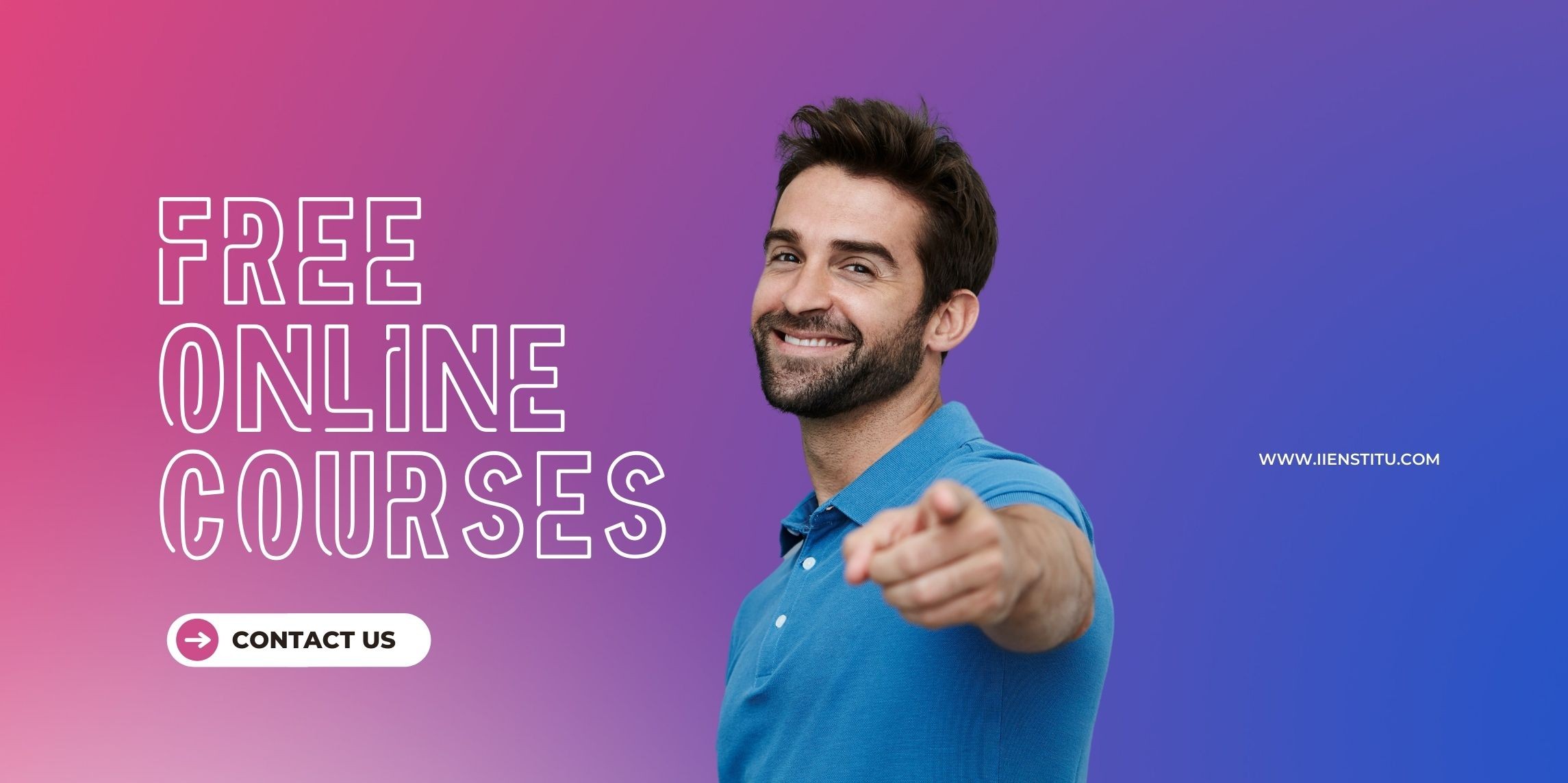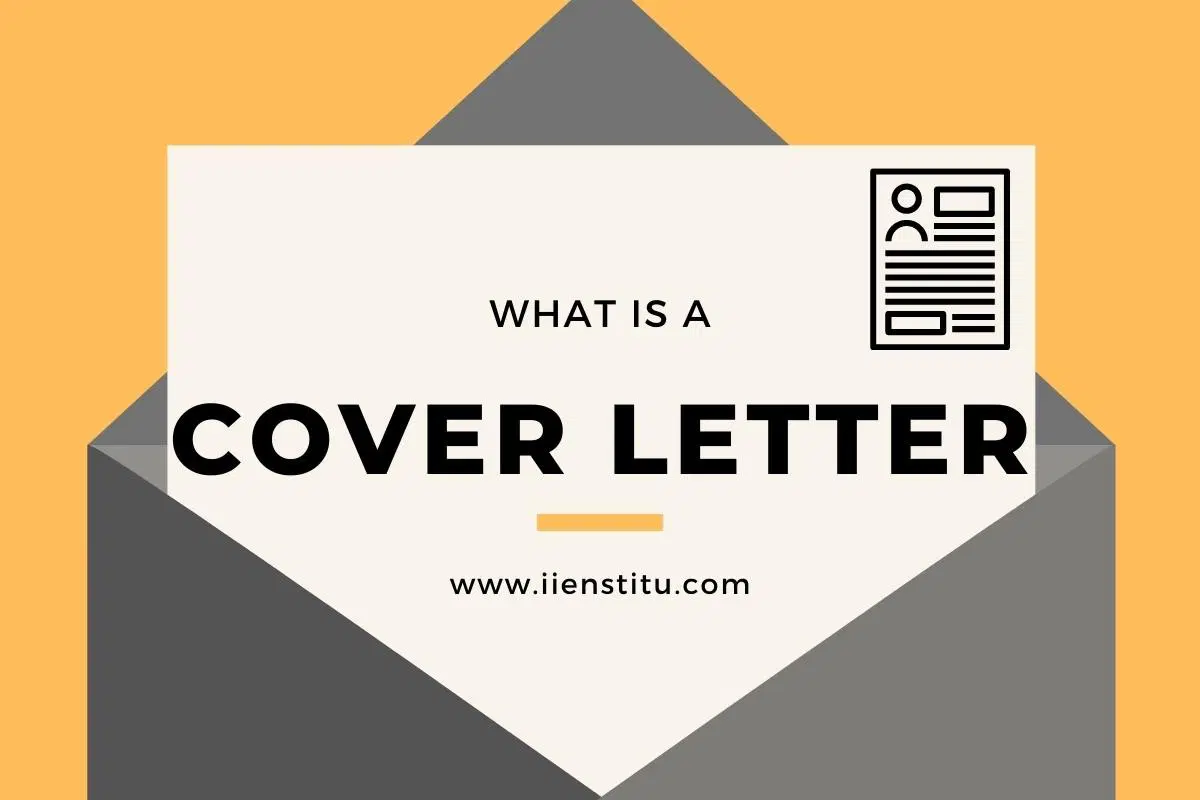
A cover letter is a cover page that you send in with an application for a job, scholarship, or any other opportunity. It's essentially a letter that explains who you are and why the organization should be interested in hiring you. In the case of an academic job application, it will highlight your research agenda and reasons for applying to teach at [University].
In general, cover letters should always follow the standard business letter format: no shorter than three paragraphs and no longer than one page. They elaborately cover why you're perfect for this position by highlighting your relevant skills and experiences. A cover letter can help set you apart from other applicants with similar qualifications because it gives the employer a glimpse into who you are as a person.
Your cover letter will, at the very least, cover the following items:
- Why you're applying for this position;
- How your background fits with what the employer is looking for; and - The value that you can bring to this institution.
Learning how to write a cover letter sounds like it's pretty straightforward because cover letters are so short. But if you've never written one before, you might not know where to start or what really makes a good cover letter great. You may wonder whether employers even read cover letters or whether they just glance over them quickly before sorting through applications based on grades and test scores alone. Here's some information that should help clarify things for you!
What does it take to write a cover letter?
While a cover letter is a short document, it can be quite daunting to write. You should take time to learn the cover letter format and reflect on how your credentials align with what the employer is seeking. But before you even reach that point, there's research to do! Although cover letters are relatively brief compared to other kinds of academic writing, you should still aim for an in-depth investigation into each opportunity that you put yourself forward for. Your cover letters will have more impact if they're completely customized to the particular opportunities you're applying for. Here's some information about research:
When researching a cover letter opportunity, make sure you've read through all of the relevant position postings thoroughly and taken notes on what makes this position great. Also, look for information about the employer's goals and objectives in this position -- you'll need to highlight how your work will align with these goals to show that you're committed to achieving them. You can also do online research to learn about what makes [University] unique and how it has managed its recent growth while maintaining high academic standards.
How To Answer What Relaxes You During Stressful Times İnterview Question
Best Way To Answer How Do You Approach Problem Solving İnterview Question
d in their job postings or instructions. Always follow cover letter guidelines carefully when sending these along to employers. Consider addressing cover letters to specific people at each organization rather than "Dear Sir/Madam" if possible -- do some research to find contact information for someone who has been involved with other positions at [University]. This shows that you've done your homework about the institution and have put effort into researching who it is that makes final decisions about your application! Make cover letters brief, precise, and professional for cover letter success.
What's the cover letter format?
The cover letter format should include the cover letter greeting of who sent it to them, the cover letter opening statement that grabs their attention, a complete paragraph listing your skills/qualifications for why you're qualified for this cover letter opportunity. One or two body paragraphs that describe specific skills/experiences/accomplishments aligning with what is stated in the job posting (and not just state generic statements about how awesome you are), and finally a closing paragraph thanking them for taking time out of their day to review your application. Include your contact information (or another way they can reach you). The cover letter format needs to be neat and clean.
How do I write cover letters?
Write cover letters that are short, precise, and professional for cover letter success. The cover letter opening should read like the beginning of an article (grabbing their attention with a strong opening statement). Your cover letter's writing should be concise; you don't want to ramble on about your life story -- keep it focused on what they need to hear. Your cover letter can include one or two body paragraphs describing specific skills/experiences aligning with what is stated in the job posting (and not just state generic statements about how awesome you are), then finish off with a closing paragraph thanking them for taking time out of their day to review your application. Make sure that you show that have done your homework on the organization you are applying to, so include their name in your cover letter greeting and anywhere else where it's appropriate. Make sure to follow cover letter guidelines carefully when sending these along to employers.
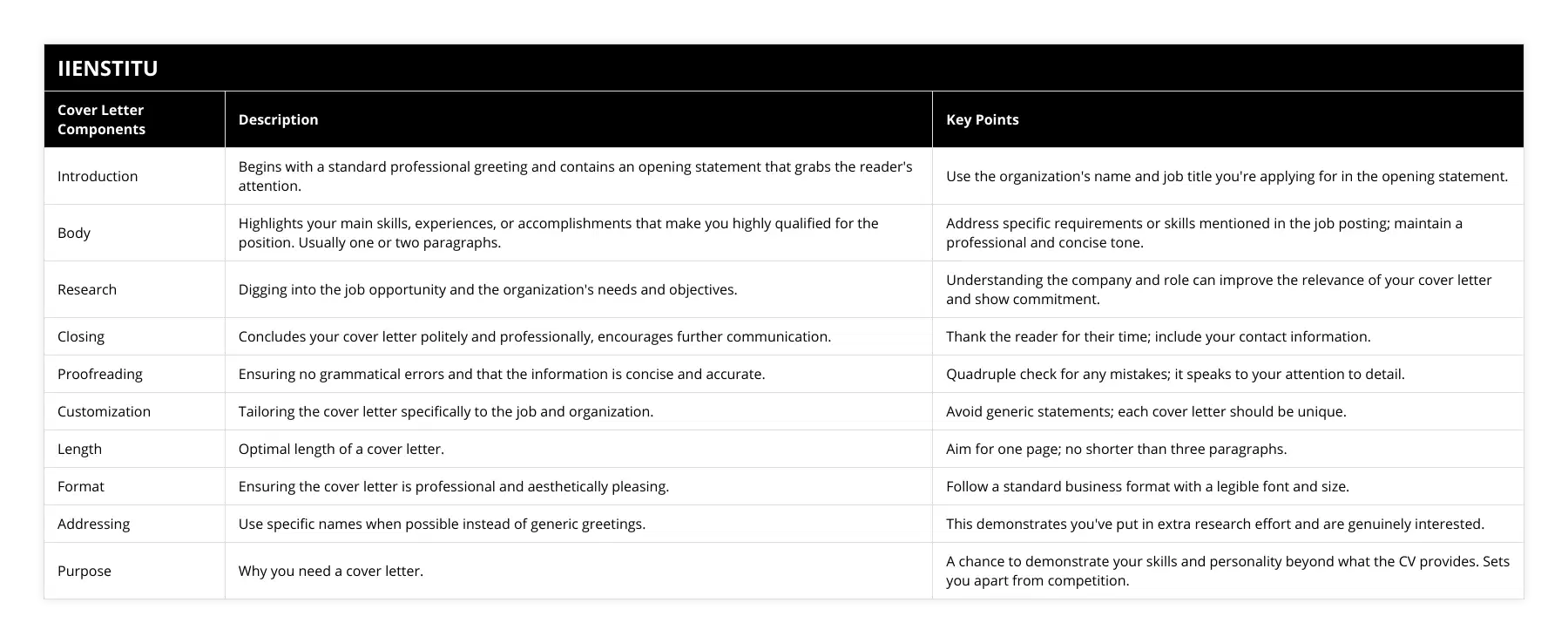
Frequently Asked Questions
What is the cover letter format?
Cover letter format should include greeting of who sent it, opening statement that grabs their attention and paragraph listing your skills for why you are qualified.
![A cover letter is a professional document that accompanies your resume and provides an introduction to your application. It is an opportunity to highlight how your skills and experiences align with the requirements of the position you are applying for while showcasing your personality and enthusiasm for the role. A well-crafted cover letter follows a standard format that enables the reader to quickly grasp the relevance and value of your application.### Cover Letter Format:**Header:**The cover letter starts with a header that includes your contact information. This should be aligned to the left or centered at the top of the page, and it typically includes your name, address, phone number, and email address. Below your contact information, you may include the date and the contact details of the hiring manager or company to which you're applying. If available, address the cover letter to a specific person by name, as it shows that you have undertaken some research and adds a personal touch.**Salutation:**Your cover letter greeting should be formal and addressed to the appropriate person. If you know the name of the hiring manager, always use their name (e.g., Dear Mr. Smith). If you can't find the name of the hiring person, a general greeting like Dear Hiring Manager can be used.**Opening Paragraph:**The opening of your cover letter should capture the reader's attention and introduce the reason for writing. Begin by mentioning the job for which you are applying and how you heard about it. This is also the place to connect your interest in the company and position with your professional background in a compelling way that encourages the reader to continue.**Body Paragraph(s):**The body of the cover letter should be one or two paragraphs that detail your qualifications, skills, and experiences. Here, you should explain why you are a suitable candidate for the job by aligning your skills with the job description. Provide examples of your past accomplishments and how they relate to the potential role. Instead of repeating your resume, delve into specific instances where you added value, solved a problem, or achieved results.**Closing Paragraph:**Your final paragraph should summarize your interest in the position and reiterate the value you can bring to the company. This is your opportunity to make a final impression, so make sure to also express your eagerness to discuss your application further in a job interview. You can also mention that you will follow up on your application within a specified time frame, but make sure to do so if you promise this action.**Formal Closing:**The sign-off should be professional and polite. Options like Sincerely, Best regards, or Kind regards are standard and appropriate. Follow this with your name and, optionally, a professional signature if you are submitting an electronic application.### Example:John Doe 123 Maple Street Anytown, State, Zip Phone: (123) 456-7890 Email: johndoe@email.comFebruary 10, 2023[Name of Hiring Manager] [Title] [Company Name] [Company Address] [City, State, Zip] Dear [Name of Hiring Manager],I am writing to you regarding the [Job Title] position at [Company Name] as advertised on [where you found the job posting]. With a profound background in [Your Field/Expertise], I am excited about the opportunity to contribute to the innovative work being done at [Company Name].In my current role at [Your Current or Most Recent Company], I successfully [mention a key achievement or relevant project]. This experience, coupled with my expertise in [Specific Skill or Area of Expertise], prepares me to make a strong impact at [Company Name].I am particularly impressed with [something notable about the company or department], and I believe my [a skill/attribute relevant to the job posting] will enable me to enhance your team's performance. [Optional: insert any personal connection to the company or role that may resonate with the hiring manager.]I am very enthusiastic about the possibility of joining [Company Name] and am keen to discuss how I can contribute to the success of your organization. Thank you for considering my application. I look forward to the opportunity to discuss my candidacy with you further.Sincerely,John Doe---This sample demonstrates the key components of a cover letter format while providing a concise outline that connects the candidate's experience and skills with the company's needs. Tailoring the content for each job application is essential, ensuring that the information is relevant and reflects genuine interest and suitability for the role. Remember, the cover letter is not just a formality but your chance to make a memorable first impression on a potential employer.](https://img.iienstitu.com/assets/blog/en/what-is-a-cover-letter/faqs/1/images/5c33dce99f424526b03b8a063d7d7da94c7b8144.jpeg?v=2025-11-13&width=3840&quality=60&format=webp)
How do you write cover letter?
You can firstly handle your skills. Why you can work for and the other things like a work expect must be included.

What does it take to write a cover letter?
This must be completely customized to particular opportunities you are what applying for.

What is the purpose of a cover letter in the job application process?
The Purpose of a Cover Letter
Introduction to Candidates
A cover letter serves as a crucial component in the job application process, offering job seekers the opportunity to distinguish themselves from other candidates. This personalized document enables applicants to showcase their unique skills, qualifications, and relevant experiences that make them the ideal candidates for the position. In essence, a cover letter functions as a preliminary introduction and marketing tool, designed to capture the attention of hiring managers and encourage further consideration.
Highlighting Relevant Skills and Qualifications
In crafting an effective cover letter, applicants can strategically emphasize specific skills or knowledge that directly align with the position's requirements, setting them apart from competing job seekers. By tailoring the content to suit the targeted role, the candidate demonstrates not only a clear understanding of the job expectations but also a genuine interest in their potential employer's organizational goals and values. This attention to detail and personalization ultimately plays a significant role in determining the applicant's suitability for the role, paving the way for a possible interview or further recruitment stages.
Demonstrating Cultural Fit and Motivation
Beyond showcasing qualifications, cover letters also allow applicants to express their genuine passion for the role and illustrate how their personal values align with the company's culture. By exploring potential synergies between their own aspirations and the organization's mission, job seekers can effectively demonstrate how they might contribute to a company's overall success. Including examples of relevant accomplishments or experiences further substantiates the applicant's claims and bolsters their credibility as a desirable candidate.
Adding a Human Touch
Lastly, a well-crafted cover letter breathes life into the often impersonal nature of job-seeking, transcending the rigid confines of a traditional résumé. By infusing their application with a unique voice and perspective, candidates can foster a sense of connection with their prospective employer and set the stage for a more engaging and meaningful recruitment experience. This human aspect of cover letters not only aids in generating interest but can also leave a lasting impression on the hiring manager, both strengthening the applicant's chances of selection and potentially influencing future employment opportunities.
In conclusion, the purpose of a cover letter in the job application process is multifaceted, encompassing the objectives of candidate differentiation, skill showcasing, cultural fit assessment, and the establishment of a personal connection. By adeptly leveraging this essential tool, applicants can significantly increase their chances of securing an interview and potentially obtaining their desired position.
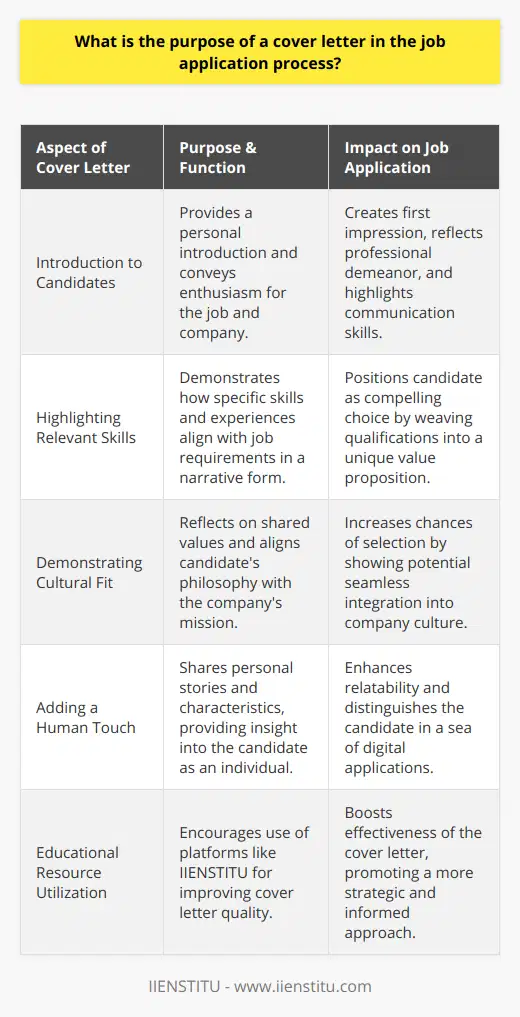
How can a cover letter complement and enhance the content of a resume?
Cover Letter's Role in Employment
**Highlighting Key Experiences**
A cover letter provides an opportunity to emphasize specific, relevant experiences to the targeted job position. By expanding on key moments from the resume, the cover letter can illustrate how the applicant's expertise directly relates to the job requirements.
**Demonstrating Personal Attributes**
The applicant's personal attributes play a crucial role in the hiring process, and a cover letter helps showcase these qualities. Through examples and anecdotes, the applicant can demonstrate their positive qualities like motivation, adaptability, and strong work ethics that may not be apparent in the resume.
**Aligning with Company Values**
Additionally, a cover letter enables the job seeker to establish a connection with the prospective employer by expressing how their values and objectives align with those of the company. This alignment fosters a sense of belonging and commitment, which is highly appealing to employers.
**Providing Further Context**
A cover letter can complement the resume by offering additional context to the applicant's experiences and achievements. This explanation helps to provide a richer understanding of the candidate and allows them to display essential soft skills like communication and critical thinking abilities.
**Addressing Employment Gaps**
In some cases, applicants may have gaps in their employment history. A cover letter offers an opportunity to address these gaps and provide explanations that can mitigate any doubts or concerns potential employers may have.
In conclusion, a cover letter significantly enhances the content of a resume by delving deeper into specific experiences, showcasing personal attributes, aligning with the company's values, and addressing employment gaps. Consequently, a well-crafted cover letter can help the applicant stand out and increase their chances of securing the desired job.
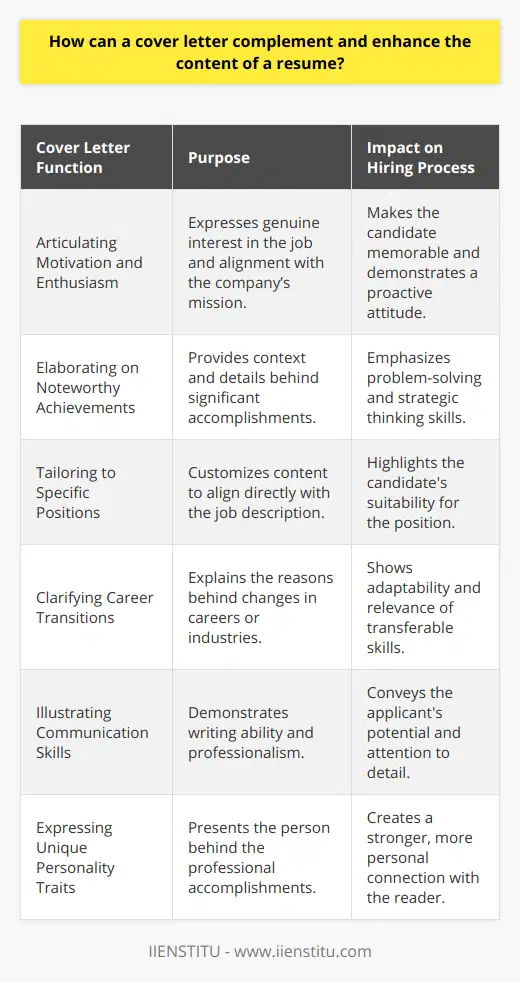
What are some key elements that should be included in a well-crafted cover letter?
Effective Introduction
A well-crafted cover letter should begin with a strong and engaging introduction. This section should effectively grab the attention of the reader and create a positive first impression, prompting them to continue reading. Briefly mention the position being applied for and express enthusiasm for the opportunity.
Relevant Skills and Qualifications
The body of the cover letter should address the applicant's relevant skills and qualifications. This includes elaborating on experiences and achievements that directly relate to the desired position. Articulating how the applicant's abilities align with the employer's needs is essential. Provide concrete examples to demonstrate the transferability of these skills.
Tailored Content
Tailoring the cover letter to the specific job and company is crucial. In-depth research about the organization and its values can help the applicant present themselves as a suitable candidate. Reflecting an understanding of the company's culture and goals will convey genuine interest and contribute to the overall effectiveness of the letter.
Accomplishment Highlights
To stand out among other applicants, strategically highlight major accomplishments from past experiences. Use the cover letter to briefly explain the impact these achievements have had and how they can benefit the prospective employer. Quantify results, where possible, to provide a clear picture of the applicant's capabilities.
Clear and Concise Writing
A well-crafted cover letter should be clearly written, concise, and free of typos and grammatical errors. Use active voice to create a strong and confident tone. Readability can be improved by shortening sentences and using simple language. Keep the letter focused and relevant to maintain the reader's attention throughout.
Professional Tone
Maintaining a professional tone is essential in a cover letter. While it is important to convey personality, avoid using informal language or colloquialisms that may not be appropriate. Be respectful and courteous in addressing the recipient, and use a formal closing to wrap up the letter.
Strong Conclusion
The conclusion of the cover letter should reiterate the applicant's enthusiasm for the position and their confidence in fulfilling the role. End by thanking the reader for their time and express interest in further discussing the opportunity through an interview. Leave a lasting impression by summarizing key points and expressing a strong desire to contribute to the company's success.
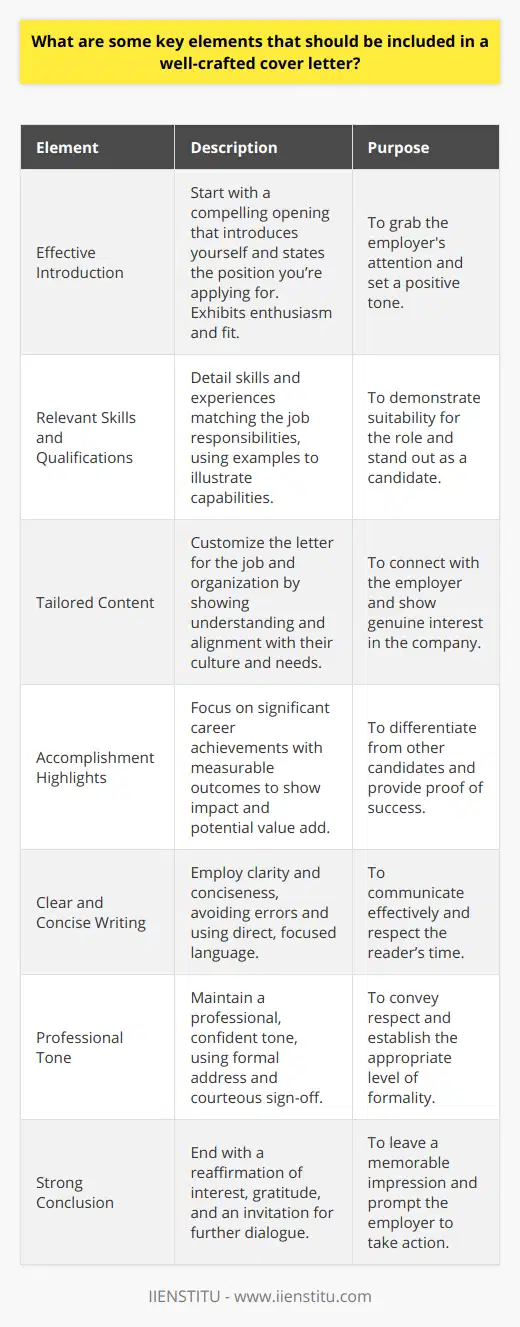
What is the difference between a cover letter and a resume in terms of content and purpose?
Key Differences in Content and Purpose
A cover letter and a resume serve distinct roles in the job application process, with each document catering to separate purposes and highlighting disparate content. Essentially, a cover letter showcases an applicant's ability to articulate why they are the ideal candidate for a position, while a resume outlines their relevant qualifications and experiences.
Content of Cover Letters and Resumes
A cover letter typically comprises a personalized introduction, followed by a concise yet compelling narrative that connects the applicant's background with the position's requirements. It should explain the motivation behind applying for a particular role, and how the candidate's experiences and skills match the job description. Furthermore, cover letters may also address any potential concerns, such as employment gaps or relocations.
On the contrary, a resume lists the applicant's qualifications and experiences in a clear, organized manner. This may include sections such as education, work experience, skills, and achievements. A resume is a snapshot of the candidate's professional history, where each entry should demonstrate their skills and accomplishments pertaining to the target position.
Purpose of Cover Letters and Resumes
The primary purpose of a cover letter is to provide context and clarity for the applicant's suitability for a specific role. It offers the candidate a platform to elaborate on how their experiences and qualifications align with the employer's needs. Moreover, a well-crafted cover letter can facilitate a personal connection with the hiring manager, making the applicant memorable.
Conversely, the purpose of a resume is to highlight the candidate's pertinent skills, experiences, and qualifications in a concise, easily digestible format. This document allows hiring managers to quickly evaluate whether an applicant meets the basic requirements for the position. A well-structured resume can aid in efficiently sifting through numerous applicants to identify potential candidates for an interview.
In conclusion, both cover letters and resumes are essential components of job applications. The cover letter offers a more personalized, narrative approach to showcase a candidate's fit for a role, while the resume provides a comprehensive overview of their professional history. When combined, these documents can effectively convey a candidate's unique value to prospective employers, substantially increasing the likelihood of securing an interview.
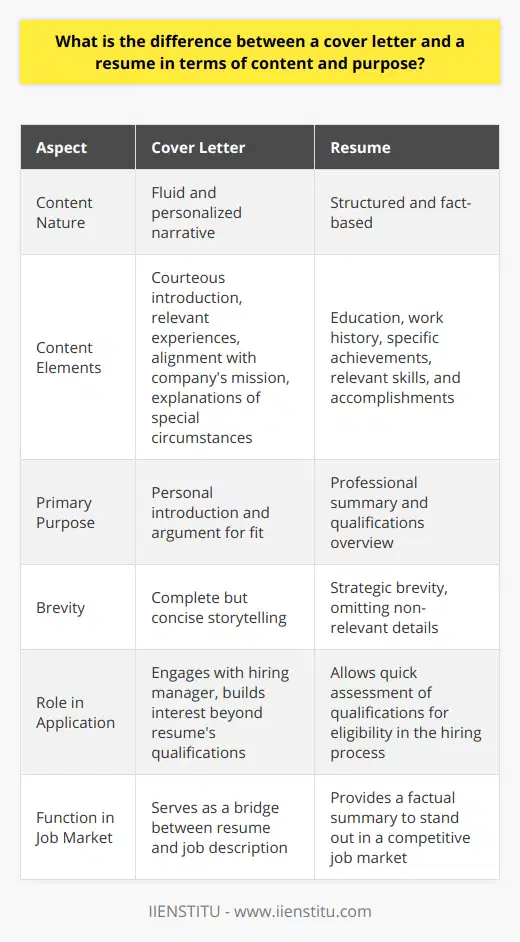
What role does a cover letter play in highlighting relevant qualifications and experiences for a specific job?
Role of a Cover Letter
Introducing the Candidate
A cover letter serves as a candidate's formal introduction to a prospective employer, effectively bridging the gap between their application and the job requirements. It allows the job seeker to present their skills, qualifications, and experiences in a personalized manner, giving the reader a concise preview of who they are and why they are a suitable fit for the position.
Tailoring to Specific Jobs
The cover letter's significance lies in its ability to be tailored for each specific job opportunity, emphasizing the applicant's relevant qualifications and experiences. As opposed to a generic resume, which may be submitted to multiple positions, the cover letter provides ample space for the candidate to highlight exactly how the job requirements align with their background.
Beyond the Resume
Though a resume offers a comprehensive overview of one's professional experiences and achievements, it often lacks the space to illustrate the unique aspects of the applicant's personality and work ethic. A cover letter helps bridge this gap by bringing the resume to life and conveying the candidate's passion and dedication to the role through specific examples of past accomplishments and transferrable skills.
Addressing the Employer's Needs
One of the key responsibilities of a cover letter is to address the employer's needs, showcasing how the candidate's background meets the requirements of the specific job posting. This may involve highlighting certain experiences, skills, or qualities that the employer has specified in the job description, which in turn demonstrates the applicant's thorough research and understanding of the role and the company.
Easing the Selection Process
Finally, a strategically written cover letter eases the employer's selection process by presenting a clear, concise, and compelling argument for why the applicant is the optimal candidate for the position. By addressing key qualifications and experiences, the cover letter not only improves readability but also sets the candidate apart from the competition, making it easier for the employer to pinpoint suitable candidates.
In conclusion, a cover letter serves as a fundamental tool in promoting an applicant's relevant qualifications and experiences for a specific job. By personalizing each letter and effectively addressing the employer's needs, job seekers can greatly enhance the success of their application and increase their likelihood of being selected for an interview.
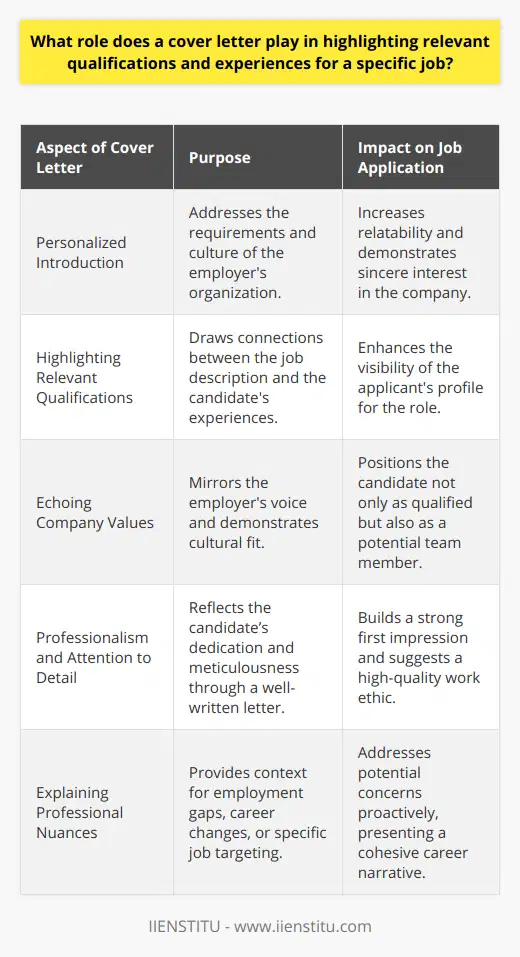
Can you provide an example of a well-structured cover letter that effectively communicates the applicant's suitability for a position?
Example of a Well-Structured Cover Letter
Introduction
A well-structured cover letter effectively communicates an applicant's suitability for a position by showcasing relevant skills, experience, and knowledge. It persuades the reader to positively consider the candidate's application and entices them to review the resume with interest. This paragraph offers an example of a well-structured cover letter to illustrate these points.
Opening Lines
Beginning with an engaging opening, the applicant addresses the hiring manager by name, if known, and expresses enthusiasm for the position. This sets a positive tone and demonstrates familiarity with the company. For instance, 'Dear Mr. Smith, I am thrilled to apply for the marketing coordinator role at ABC Company.'
Context and Connection
Next, the applicant should provide context to explain their interest in the role and company. Drawing attention to relevant aspects of their background, they must demonstrate a strong connection with the organization's values or industry. For example, 'As a marketing professional with 5 years of experience working in the healthcare sector, I am passionate about contributing to the growth of ABC Company. Your commitment to providing quality healthcare aligns with my professional values.'
Relevant Skills and Achievements
In the central part of the cover letter, the applicant highlights skills and achievements directly related to the job requirements. By using specific examples and quantifiable results, they can demonstrate their competence in key areas. For example, 'During my tenure at XYZ Healthcare, I led a team responsible for digital marketing campaigns that increased website traffic by 45% and generated a 25% increase in online appointments.'
Customization
Customizing the cover letter shows the hiring manager that the applicant has put time and effort into researching the company and understanding what they're looking for. It also distinguishes the applicant from other candidates who submit generic cover letters. For instance, 'I am confident that my experience in healthcare marketing and proficiency in Google Analytics make me the perfect fit for the marketing coordinator role at ABC Company.'
Closing
In the closing section, the applicant should express gratitude for the opportunity to apply and indicate their intent to follow up within a reasonable time. This demonstrates enthusiasm and professionalism. For example, 'Thank you for considering my application. I look forward to the opportunity to discuss my qualifications further. I will follow up within a week to confirm receipt of my application.'
To conclude, a well-structured cover letter effectively communicates an applicant's suitability for a position by crafting an engaging opening, providing context for their interest, highlighting relevant skills and achievements, customizing the content, and ending with a courteous closing. This example demonstrates these elements to create a compelling narrative to persuade the hiring manager to devote attention to the applicant's resume.
![Aspiring to join the innovative team at IIENSTITU, I am writing to express my deep interest in the Content Creator position. Understanding that IIENSTITU values comprehensive and educational content, I am eager to bring my unique blend of writing expertise and keen research abilities to your esteemed organization.Having honed my skills in content creation and digital communication, I believe that my experience aligns with the attributes you seek for this role. My background includes crafting articles on a diverse range of topics, ensuring that information is not only accurate but also engaging and valuable to readers. This has involved delving into emerging trends, perpetually updating my knowledge base, and presenting information in a way that is both accessible and intriguing to the audience.Notably, I was responsible for a groundbreaking series of articles at my previous position that explored the intersections of technology and education, which resonated strongly with our readers and increased our monthly web traffic by over 30%. Such projects have deepened my understanding of the importance of producing content that stands out in today's information-saturated world.At IIENSTITU, I recognize the potential to contribute to content that has a meaningful impact on lifelong learners. I am particularly inspired by your commitment to delivering quality online education and professional development resources. Aligning with this mission, I am ready to leverage my skills in SEO optimization, user engagement strategies, and content analytics to enhance IIENSTITU's digital presence and to further promote its educational services.I am eager to discuss how my background, skills, and enthusiasms can align with the dynamic team at IIENSTITU. Thank you for considering my application. I anticipate the opportunity to elaborate on how I can contribute to your team and am planning to reach out next week to ensure you have received all necessary documents.Warm regards,[Your Name]](https://img.iienstitu.com/assets/blog/en/what-is-a-cover-letter/faqs/9/images/c4753f14fd5310289d4fe86b82cababb605640f0.jpeg?v=2025-11-13&width=3840&quality=60&format=webp)
What is a cover letter for a job and how does it differ from a resume in terms of content and purpose?
Understanding Cover Letters
A cover letter is a vital document that job applicants submit alongside their resumes. While a resume primarily focuses on an individual's professional experience, qualifications, and skills, a cover letter customizes this information, tailoring it to a specific job opening or company. It serves a different purpose than a resume, as it allows the applicant to showcase their suitability for the role, express enthusiasm for the company, and provide context for their background.
Content Differences
One of the primary distinctions between a cover letter and a resume is the content. In a cover letter, applicants should explain their interest in the position, describe how their skills and experiences align with the job requirements, and discuss the value they can bring to the company. They can also provide examples of accomplishments that demonstrate their abilities, particularly those not extensively elaborated in the resume.
Purpose Variations
The purpose of the cover letter and resume also varies significantly. A cover letter aims to engage the employer and make a strong first impression, proving a candidate's suitability for the job. In contrast, a resume offers a concise overview of an individual's professional history, presenting their education, experience, and skills in a structured manner. A well-written cover letter enables the recruiter to appreciate the applicant's motivations and objectives more effectively, whereas a resume showcases the factual aspects of their career progression.
Conveying Personality
Another key aspect that sets cover letters apart from resumes is the opportunity for applicants to showcase their personality. Well-crafted cover letters can provide insight into an individual's passion, commitment, and communication style, which may be more difficult to convey through a resume. Writing a persuasive and engaging cover letter helps recruiters and hiring managers gauge whether the candidate will be a good fit for the company both professionally and culturally.
In conclusion, a cover letter serves as an integral component of a job application, complementing a resume by providing tailored and in-depth insights into an applicant's qualifications and aspirations. The combination of these documents allows recruiters to make a more informed assessment of a candidate's suitability and potential for success in a given role. Therefore, job seekers should invest time and effort in crafting compelling cover letters that differentiate them from other applicants and illustrate their unique value proposition.
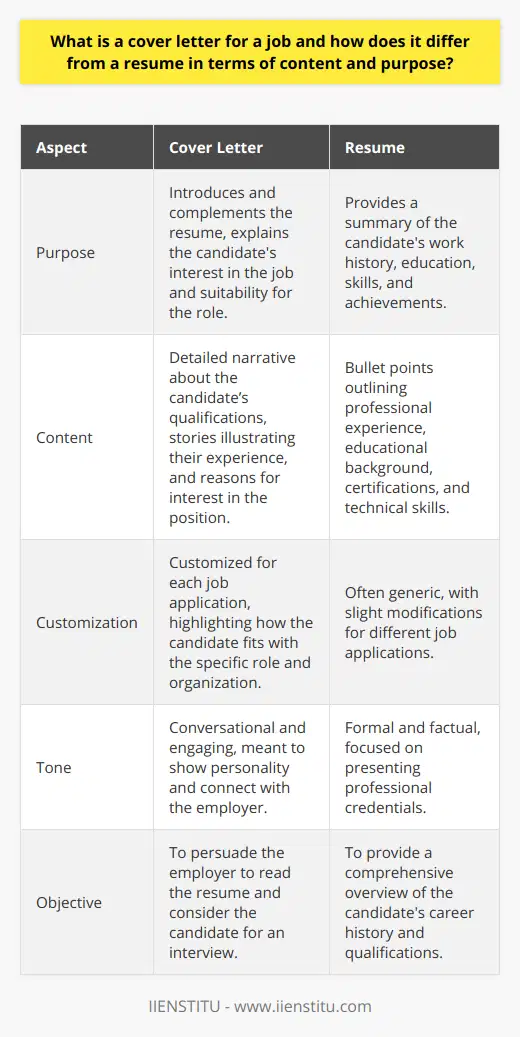
What should be included in a cover letter to effectively convey an applicant's qualifications and experiences related to the specific job?
Highlighting Relevant Skills and Qualifications
An effective cover letter should outline the applicant's relevant skills and qualifications specific to the job posting. Detailing essential qualifications, such as academic achievements and certifications, directly pertaining to the role creates a strong foundation.
Focusing on Practical Experiences
Job seekers should showcase their prior practical experiences to demonstrate their ability to perform the job duties competently. Discussing projects, internships, or previous work experiences that align with the position’s requirements will increase the applicant's credibility.
Tailoring the Letter to the Job Description
Aligning the cover letter with the job description ensures the applicant's competencies correspond with the employer's expectations. Analyzing the job advertisement for essential skills and tailoring the cover letter accordingly will make a persuasive argument for the applicant's suitability.
Emphasizing Soft Skills
In addition to hard skills, soft skills are integral for successful job performance. Applicants should highlight their ability to work in a team, problem-solving skills, and strong communication capabilities to showcase their well-roundedness and adaptability to the work environment.
Providing Measurable Achievements
Using quantifiable achievements in the cover letter demonstrates the applicant's impact and value to past employers. Including specific examples, such as increasing company revenue or reducing costs, will provide evidence of the candidate's capacity to contribute positively to the organization.
Connecting with the Company's Values
Understanding and connecting with the company's values exhibits the applicant's keen interest in the organization. Emphasizing shared values, missions, or cultural aspects between the candidate and the company fosters a sense of alignment and boosts the candidate's overall appeal.
Maintaining a Professional Tone
Lastly, an effective cover letter should maintain a professional tone throughout. Addressing the hiring manager respectfully, using proper grammar, and proofreading for spelling and formatting errors showcase attention to detail and diligence, which are valuable traits in any employee.
In conclusion, a compelling cover letter should include an applicant's relevant qualifications, practical experiences, tailored content, emphasis on both hard and soft skills, quantifiable achievements, and maintain a professional tone, all while connecting with the company's values. By incorporating these elements, a candidate can effectively convey their suitability for the targeted job.

How can a well-crafted cover letter complement and enhance the information presented in a resume during the job application process?
Significance of Cover Letters
A well-crafted cover letter plays a crucial role in complementing and enhancing the information presented in a resume during the job application process. This letter serves as a powerful tool for job applicants to showcase their unique skills and qualifications, effectively bridging the gap between their resumes and the specific job requirements.
Establishing a Personal Connection
In the job application process, the cover letter allows applicants to establish a personal connection with potential employers. By addressing the hiring manager directly, applicants can humanize themselves, create rapport, and build credibility. This personal touch can improve the chances of being invited for an interview.
Connecting Skills to Job Requirements
Cover letters provide job seekers with an opportunity to tailor their experiences and skills to the specific demands of the applied position. In this document, applicants can connect their abilities, knowledge, and expertise to the job requirements, highlighting their relevance and suitability for the role. Such clear articulation of transferable skills can make a strong impact on the hiring managers.
Communicating Motivation and Enthusiasm
Moreover, a cover letter acts as a platform for candidates to express their genuine interest and enthusiasm for the position and the organization. By communicating their motivation, commitment, and passion, applicants can effectively demonstrate their interest in going above and beyond in their roles. This can distinguish them from other candidates with similar qualifications.
Revealing Personal Attributes
Lastly, the cover letter allows job applicants to convey their personal attributes, such as excellent communication skills, adaptability, or resilience. These qualities may not be directly reflected in a resume but can significantly enhance a candidate's overall job fit. Revealing one's personal attributes can ultimately contribute to the consideration of the application.
Conclusion
In conclusion, a well-crafted cover letter can complement and enhance the information presented in a resume during the job application process. By establishing a personal connection, connecting skills to job requirements, communicating motivation and enthusiasm, and revealing personal attributes, applicants can effectively justify their suitability for a position and increase their chances of landing an interview.

What is a basic example of a cover letter that effectively demonstrates an applicant's qualifications and suitability for a position?
Overview of an Effective Cover Letter
A cover letter serves as an applicant's introductory note that articulates their interest and suitability for a specific job role. Here's an example of an effective cover letter:
Introduction to Applicant
'My name is John Doe, a seasoned market analyst with a passion for improving businesses by analyzing trends and making informed predictions.'
In this opening statement, the candidate confidently states their profession and core skill.
Outlining Relevant Experience
'I have six years of successful experience at XYZ Inc., where my market trend analysis led to a 20% profit increase over two years.'
This section affirms prior relevant work experience and integrated results achieved, thus demonstrating the candidate's competence.
Illustrating Unique Skills
'Besides, my advanced proficiency in data analysis tools like Microsoft Excel and SPSS gives me an edge in my role.'
This portion showcases other unique skills that increase the candidate's suitability for the discussed role.
Understanding of the Job Role
'I understand this role requires someone who can predict market trends and make informed decisions. I am confident that my experience aligns perfectly with these requirements.'
Here, the applicant shows an understanding of the job role and reaffirms their suitability.
Interest in the Organization
'I have always admired your organization's commitment to leveraging data to inform business decisions, and I am excited about the possibility of contributing my skills to your team.'
Showing enthusiasm about the company and the possible opportunity to contribute increases the candidate's appeal.
Closure & Follow-up
'Thank you for considering my application. I look forward to the opportunity to discuss my candidacy further. I am happy to provide additional information if required.'
The candidate expresses gratitude and openness to further interaction, thereby creating a good impression on potential employers.
Overall, a well-articulated cover letter like this displays the applicant's qualifications and suitability for the job in a professional and persuasive style.
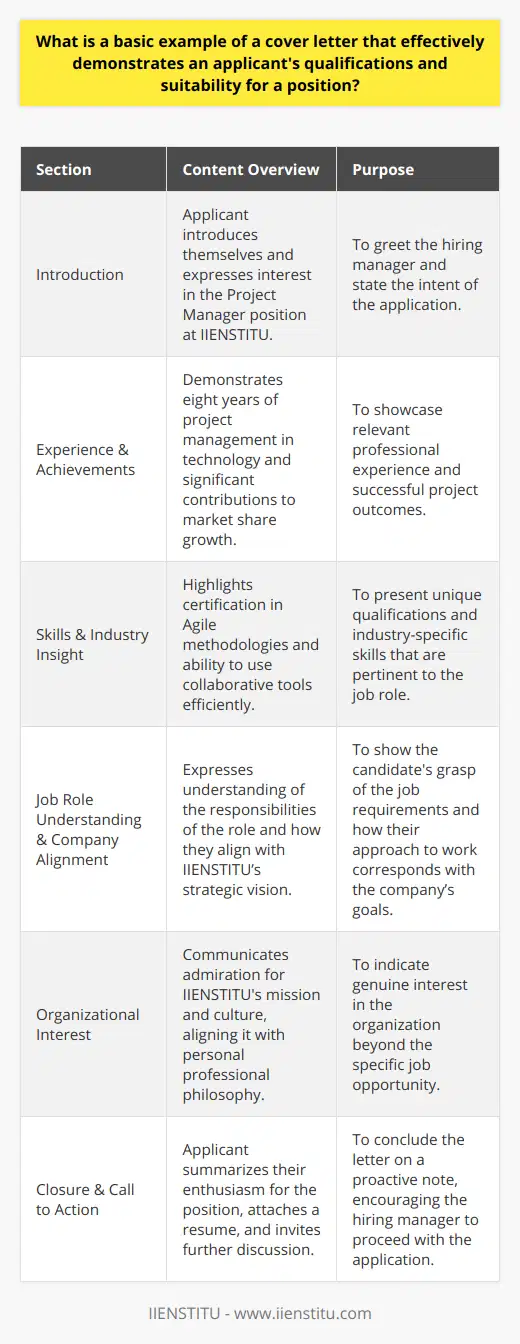
What are the 7 parts of a cover letter, and how do they interact to present a comprehensive and compelling case for a candidate's suitability for a role?
Understanding the Cover Letter Structure
A cover letter serves as an introduction of a candidate to a potential employer, stressing the applicant's suitability for a role. It entails seven integral parts that join to create a holistic and captivating approach.
Contact Information
This section includes the candidate's name, address, phone number, and email. It serves as an easy reference for employers to contact a respondent.
Salutation
The salutation is an essential greeting to the potential employer. It shows professionalism and displays respect towards the hiring manager.
Introduction
The introduction briefly yet effectively produces the goal of the application. This part also identifies the post the applicant is applying for, setting the context for the cover letter.
Body
As the most substantial part of the cover letter, the body endorses the candidate's skills, qualifications, and experiences. It demonstrates how these qualities fit the role's requirements, compelling employers to consider the applicant.
Closing Paragraph
The closing paragraph acts as a summary. It restates the applicant's interest in the role and re-emphasizes the skills that make the candidate stand out.
Sign-off
A courteous sign-off shows professionalism and respect. It poses as a cue for the end of the letter maintaining a formal tone.
Postscript
Although optional, a postscript can provoke employers' curiosity, leaving a lasting impression. It could mention a noteworthy achievement or a common connection, creating a compelling case for the candidate.
Interconnection of Components
These individual elements work cohesively to present a comprehensive case. They provide different insights into the candidate's profile, from fundamental details to qualifications. A concise yet comprehensive recollection of all the elements can successfully engage potential employers, escalate the candidate's chances of consideration, and enhance the effectiveness of the application.
When integrated seamlessly, these parts make the cover letter not just a mandatory document, but an enticing narrative of the candidate's suitability for the role. Properly composed, it can dramatically bolster an applicant's chances of landing the desired position.
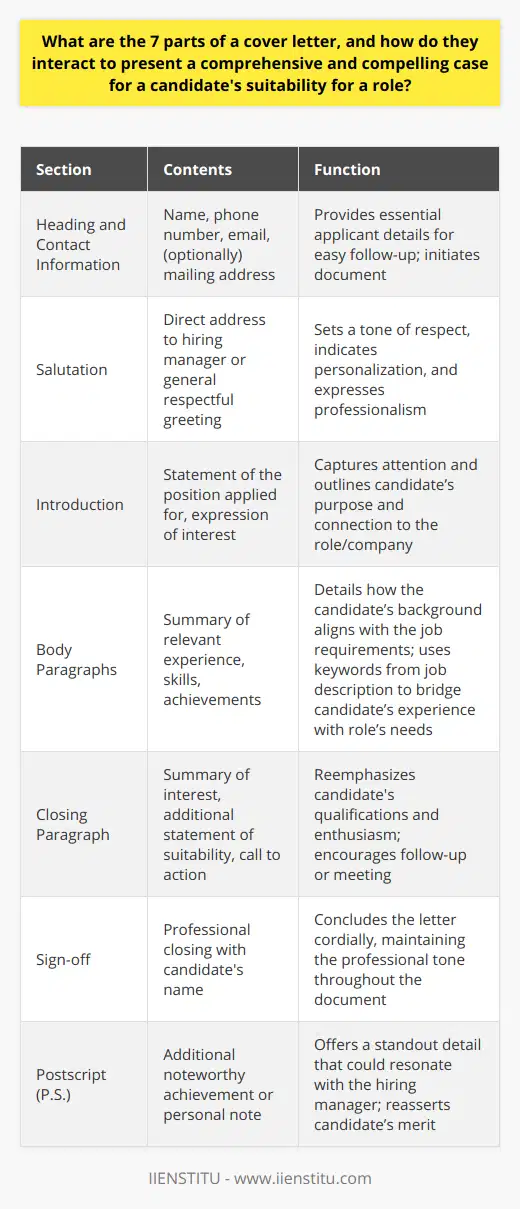
In crafting a cover letter, what recommendations can you provide for effectively highlighting relevant qualifications and experiences tailored to a specific job?
Positioning Relevant Qualifications
Positioning relevant qualifications first, is key to create an instant impact. Highlight the qualifications matching the job description directly. This not only shows your understanding of the role, but it also provides strong evidence of your suitability.
Emphasizing Relevant Experiences
Emphasize experiences related to the job specifications. Showcase how your past roles prepared you for the new position. Use explicit examples to make your case stronger, demonstrating how these experiences align with job requirements.
Use of Action Verbs
Utilize action verbs to describe your skills and experiences. Words such as 'created', 'led', 'improved' or 'managed' are impactful. They give a clear picture of your capabilities, emphasizing your proactive approach.
Link Skills to Job Requirements
Link your skills directly to the job requirements. This involves more than listing your skills. Here, you need to illustrate how your skills make you a perfect fit. More importantly, show how these skills can contribute to the company’s goals.
Showcasing Accomplishments
Evidence of your accomplishments sets you apart. Highlight achievements related to the job you’re applying for. Quantifying these gives a measurable context to your successes, which adds credibility and concrete evidence of your skills and competencies.
Customizing the Cover Letter
A generic cover letter is easy to spot and often underwhelming. Tailoring your cover letter to each job makes a very positive impression. This shows your eagerness for the role and also your understanding of what the job involves.
Concluding with A Strong Statement
A strong, positive closing statement can leave a lasting impression. Reiterate your enthusiasm for the role, your readiness to contribute and your eagerness to start. This underscores your interest and finishes your letter on a positive and assertive note.
